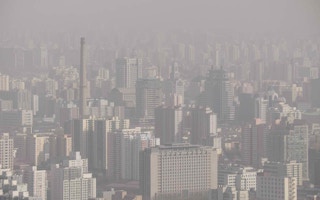As Beijing geared up for the annual session of the country’s parliament on Thursday amid a grey pall of smog, a top government adviser declared a “People’s War” on pollution, sparking widespread ridicule and criticism at the use of old Maoist jargon.
“The fight against smog is a long-running war,” Wang Guoqing, spokesman for the parliamentary advisory body, the Chinese People’s Political Consultative Conference (CPPCC) told reporters in Beijing as the authorities announced a yellow alert for pollution.
“It’s also a People’s War,” he said, calling for patience from the public, and warning that measures to tackle pollution “cannot be effective at once.”
As he spoke, the whole of northern China was under a yellow alert pollution warning, with readings of the smallest particulates, PM 2.5, hovering around 300 micrograms per cubic meter, according to the U.S.embassy in Beijing.
The embassy, which measures air quality independently of the Chinese government, described the air quality as “hazardous at 24-hour exposure to this level.” The World Health Organization (WHO)recommends levels of no more than 25 micrograms per cubic meter.
“Smog … has shrouded the country’s northern and eastern regions, including Beijing and Tianjin,” the official Xinhua news agency reported.
“Smog will blanket parts of Beijing, Tianjin, Hebei, Henan, Shandong, Jiangsu and Liaoning until Friday night,” it quoted state meteorologists as saying.
War talk mocked online
Online commentators hit out at Wang’s plea, however.
User @songtieping quipped: “Are we talking about the War of Resistance Against Japan (eight years) or the civil war (three years)? That’s the big question. We must have a timetable.”
“He is comparing anti-pollution measures to a long-running battle … but why can’t they fix the problem at its source?” user @weixianqianqianwanwanbian wrote.
Others wanted to know how it was that pollution became a “People’s War,” when the people had no share in the profits from it.
Beijing resident Liu Tianyi said there appears to have been a minor improvement in pollution levels in the capital since the governmentintroduced a slew of new anti-pollution measures last year.
“There is some fog today, but it’s not really bad; maybe medium to mild,” Liu said. “There’s a yellow alert, but it’s much better than the same time last year.”
“It comes in fits and starts … but I’m still not very happy; after all, the air that we breathe is a pretty major issue,” he said.
“It affects our health, and it affects our mood, when every day is so gloomy.”
He said many Beijing residents are highly suspicious of calls for patience, because the government has shown it is able to clear the city’s skies for major international events, a phenomenon that has been dubbed “APEC blue” after a gathering of the Asia Pacific Economic Cooperation forum.
“I think that this is really about profit … because a lot of the pollution is linked to heavily polluting industries in Hebei,” Liu said.
“We have blue skies for … a military parade, but once the political event is over, then the grey comes flooding back in again.”
Police harass environmentalists
Environmental activist Wu Lihong said the responsibility for the smog ultimately must remain with the ruling Chinese Communist Party.
“Of course it’s mostly the government, because it’s only the government who has the wherewithal to make laws, and to enforce them,” Wu said.
“If industry would respect the law, then the problem wouldn’t be as serious as it is now,” he said.
Giving the lie to the concept of a People’s War, Wu said he has frequently been targeted for police harassment because of his environmental activism.
“I have been detained on the streets of Beijing and escorted home by state security police from my hometown,” he said. “My work is on behalf of everyone, so why do they expend so many resources, so much time, money and energy [on suppressing me]?”
“They shouldn’t be doing that,” he said.
Shandong-based independent commentator Zhang Hengjia said pollution in China is closely bound up with the country’s political system.
“The smog in China basically stems from issues of power in China, because power doesn’t base itself on scientific evidence,” Zhang said.
“They know the law and they break it anyway; and [the government] does nothing to stop them,” he said. “Of course it’s mostly about official inaction.”
“There is no way to wipe out corruption; you can just pay a bit of money, pay the fine, give a few gifts and it all goes away. All this is totally normal,” Zhang said.
“And in an authoritarian regime such as that of the Chinese Communist Party, there is no way to make adjustments to the system, and so the smog just gets worse and worse.”
Last month, scientists published a report showing that air pollution kills more than 5.5 million people around the world each year, with some 1.6 million people dying of air pollution in China in 2013.
Researchers warned the American Association for the Advancement of Science conference in Washington that air pollution is the fourth-highest risk factor for death globally and by far the leading environmental risk factor for disease.
In China, burning coal is the biggest contributor to poor air quality, causing 366,000 deaths in 2013, according to Qiao Ma, a Ph.D. student at prestigious Qinghua University in Beijing.
In February, Beijing and New Delhi typically see daily levels of PM 2.5 at or above 300 micrograms per cubic meter — 1,200 percent higher than WHO guidelines, researchers said.
Copyright © 1998-2016, RFA. Used with the permission of Radio Free Asia, 2025 M St. NW, Suite 300, Washington DC 20036.










